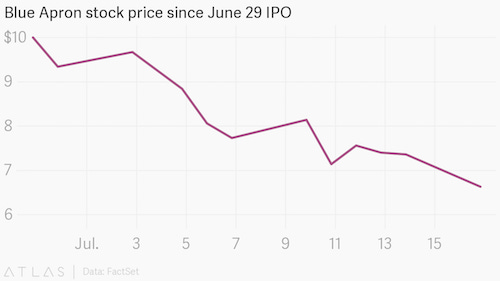People are gross.
And they have a nasty habit of throwing up in taxis. Traditionally this has been the problem of the Uber/Lyft/taxi driver. But what about when there is no driver?
How to deal with vomit represents one of many great unanswered questions about the mythic business model that Kalanick once summed up as, basically, getting rid of “the other dude in the car.” In the future he and Lyft co-founder John Zimmer have described, apps and bots do the work, consumers save big time and investors just rake it in. But number-crunchers at GM and companies including Apple Inc. and Alphabet Inc.’s Waymo are adding up a lot of costs that will get in the way of robotaxis being cash cows.
Self-driving cars are often talked about as the silver bullet to ride-hailing’s financial woes. There is a general sense that once companies like Uber are able to eliminate that other dude—the one they pay to do the driving—they will stop losing billions of dollars a year and start making billions instead. But maybe it’s not that simple. Driverless cars will still need to be insured, maintained, stored when not in use. They’ll also need to be kept clean, but won’t have a human right there to observe when a rider does something gross, like spilling their food all over the backseat, trekking in mud, or getting sick. Put another way, who will clean up human messes when there’s no longer a human driver? A year ago a professor at Vanderbilt suggested in this article that a lot of that could fall on the passenger. That’s true, but I somehow doubt riders would like it if they were charged with reporting when a driverless car happened to show up covered in vomit.
Anyway these are question for the future; let’s return to the questions of today. “Ever felt hungry or spilled your coffee in an Uber?” asks this story. “Technology startup Cargo has found a solution to those issues and more with its new compact vending machines.” Cargo distributes its vending machines to drivers for free but says it gets paid by some brands to stock their products. “As a passenger, when you get into the car, you don’t have to download an app, there’s no login, there’s no signup, there’s no nothing,” says Cargo CEO Jeff Cripe. “You can just order products on your phone… and your driver will hand them back to you immediately.” No login! No signup! Immediate product delivery! I would say this is just a normal vending machine but because it is in an Uber it is clearly a technology enabled, on-demand vending machine.
Elsewhere, This Minister Turned His Uber Car Into a Church on Wheels. (“I only play classical music, my car is immaculately clean, and they can sense the presence of God.”)
Hotel espionage.
Share Better is a hotel-funded group fighting a “guerrilla campaign” against Airbnb. It’s been doing that for several years, but since New York passed strict regulations of short-term home rentals last year, Share Better’s role in the campaign has shifted from consultant and branding expert to pseudo-law enforcement. According to Bloomberg, Share Better and its operational head, Neal Kwatra, have retained investigative firm Lemire LLC to conduct three to five stings on so-called illegal hotels a month. It plans to spend more than $1 million on anti-Airbnb efforts this year.
To pick targets, Kwatra’s team scrapes data from Airbnb’s website, building a map of listings from the rough coordinates the site provides and scouring hosts’ profiles for signs they could be violating the law. Lemire’s investigators, who carry out-of-state IDs and set up fake social media profiles to allay suspicion, bring hidden cameras and check rooms for signs, such as tiny shampoo bottles or a lack of family photos, that the “shared homes” are de facto hotels. They then relay their dossiers to the Mayor’s Office of Special Enforcement, which says it spends 95 percent of its time trying to stamp out illegal rentals.
“We are bringing them, wrapped in a bow, a bunch of leads to make their enforcement efforts that much more efficient,” says Kwatra, a former hotel-union official who also used to be Schneiderman’s chief of staff and who’s advised New York Governor Andrew Cuomo (and, ironically, Uber). Share Better has given files on dozens of listings to the city this year and set up a hotline that guides New Yorkers through reporting their own complaints.
A long running question for cities that pass strict regulations of Airbnb has been how they plan to enforce those regulations. Airbnb has historically not been cooperative in sharing its data and most cities don’t have the resources to monitor Airbnb listings around the clock. That said, I’m not sure fake social media profiles and hidden cameras funded by the hotel lobby are the right prescription, especially for governments like New York that have long been accused of being in the pocket of hotels. Airbnb is irate. “This revelation appears to to build on a pattern of your office turning to the hotel industry to target Airbnb hosts,” Josh Meltzer, Airbnb’s New York head of public policy, wrote in a letter to the city’s Office of Special Enforcement. “Nixon-era intelligence gathering tactics have no place in responsible New York governance.”
Airbnb has since filed a formal complaint with a state ethics panel alleging that Share Better failed to register as a lobbyist, disclose its backers, and properly report its lobbying expenses. In response, Share Better member and New York State assemblywoman called for Airbnb’s own lobbying activities to be examined, to which Airbnb spokesman Peter Schottenfels said, “any complaint by hotel-funded ShareBetter is like Al Capone accusing Elliot Ness of being a mobster.” You have to love when the sharing economy meets New York politics.
Trademarks that kill.
Jeff Bezos is out to crush Blue Apron.
Two weeks before the meal-kit company debuted on the New York Stock Exchange, Amazon inked a deal to buy Whole Foods Market for $13.7 billion. One week after the IPO, Amazon Technologies, a subsidiary of Amazon.com, registered a US trademark for the phrase, “We do the prep. You be the chef.” The trademark is for “prepared food kits composed of meat, poultry, fish, seafood, fruit, and/or vegetables and also including sauces or seasonings, ready for cooking and assembly as a meal,” aka exactly what Blue Apron does.
Blue Apron’s stock fell 10.6% yesterday and is already down another 2.5% this morning. Since its June 29 IPO, the company has lost more than a third of its value. Gizmodo said it best: “At This Point, Amazon Can Crush a Company Just by Filing for a Trademark.”
Investors are scared, and they should be. Jeff Bezos set his sights on grocery long before Amazon announced its deal with Whole Foods, but it’s only in the last month that the company has begun an all-out assault on competitors in the grocery and food delivery sector. It’s not just Blue Apron that should be alarmed. It’s HelloFresh and Sun Basket and Postmates and DoorDash and, yes, Grubhub. Despite what those companies may tell their investors, their businesses are less technology than logistics. And there is no more formidable logistics opponent in the US than Amazon.
Amazon Prime doesn’t currently include grocery delivery, but one day it might. It’s easy to imagine a world in which a Prime membership, currently $99 a year, gets a little bit more expensive and entitles you to free online grocery ordering, pickups at, and delivery from Whole Foods, if not other stores. The same goes for food delivery, and for meal-kits. Amazon is actively building out one-hour delivery from restaurants for Prime members in major US cities and it has registered its interest in meal-kits. Blue Apron’s entire business could one day for Amazon be a single line on the list of Prime benefits. That’s sure to leave a bad taste in its investors’ mouths.
Brandless™.
Elsewhere in trademarks, Brandless is an e-commerce startup that launched last week. It sells a variety of Brandless-branded foods and household goods, all priced at $3. Brandless says it can do this by eliminating the BrandTax, a phrase it requested a trademark for last November and which it defines as the “hidden costs you pay for a national brand.” It’s raised just under $50 million from venture capitalists.
Brandless cares a lot about its brand. The company’s simple white labeling was designed by a team of product and marketing experts and food scientists, what co-founder and CEO Tina Sharkey calls the “white box council.” The products are tailored to the “conscious urban millennial” and other shoppers who are “very connected to their values.” “We're not anti-brand, we're not not a brand, we're just reimagining what it means to be a brand,” Sharkey told me.
Sharkey has been laying the groundwork for Brandless with her co-founder, Ido Leffler, for three years. Before that she co-founded women’s media site iVillage, led community programming at AOL, served as chairman and global president of Johnson & Johnson subsidiary BabyCenter, and was CEO of Sherpa Foundry, a group founded by Sherpa Capital partners Shervin Pishevar and Scott Stanford that promotes startups to traditional and non-tech companies.
I interviewed Sharkey on Monday. She has a way of speaking that wouldn’t have sounded out of place at Gwyneth Paltrow’s recent Goop Summit. The Brandless movement is the “democratization of goodness.” It’s that everyone “deserves better, and better shouldn't cost more.” Brandless wants people to “live more and brand less,” to “tell their own stories” and drop the “false narratives” sold by Madmen and Madison Avenune. I assume they’ll trademark that, too.
Other stuff.
Rover raises $65 million for pet-sitting. Saucey raises $5.4 million for on-demand alcohol. WeWork raises $760 million for valuation of $21 billion. Grab in talks to raise up to $2 billion from SoftBank and Didi. Uber Saved Ice Cube From Missing Headline Performance. Welcome to Our Startup Where Everyone Is 23 Years Old. Silicon Valley’s financial plumbing is all clogged up. Yandex.Taxi bests Uber in Russia. Azerbaijan cuts ties with Uber and Yandex. Waymo tests self-driving car in Death Valley. Baidu CEO under investigation for self-driving car stunt. Uber loses engineering manager implicated in Fowler blog post. Uber weighs replacements for Travis Kalanick. Uber increases booking fees. Uber acquihires Swipe Labs to humanize its driver app. Uber’s corporate culture. Lyft adds carseats for a $10 fee. Airbnb integrates with Concur. Airbnb has a married-couples-only problem in India. Racist Airbnb host fined $5,000 and ordered to take class in Asian American studies. Uber drivers advance employment lawsuit. What a London Cabbie Taught Me About Uber. San Joaquin partners with Uber. Flash organizations. Minnie Van. Airbnb for nurses.







